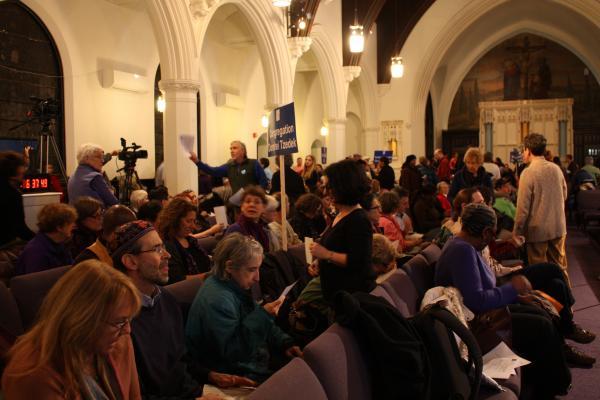February 9, 2017

The scene inside Bethel AME Church last Thursday. Clara Hudson photo
A large crowd gathered at the Bethel AME Church in Jamaica Plain last Thursday evening (Feb. 2) to address health care, affordable housing, and criminal justice reform. The crowd, which overflowed from the church’s main hall, was made up of more than 800 members of the Greater Boston Interfaith Organization (GBIO). Thursday’s event was dubbed “For Such a Time as This,” referencing a biblical story about stepping up in times of crisis.
“I’m really amazed by the turnout, but maybe I shouldn’t be,” said Dr. Jeanette Callahan from the Bethel AME Church and GBIO Strategy Team. “People turn out when there is energy.”
Rev. Burns Sanfield, the president of GBIO, saw potential for the community to unite in this critical time as “black, white, urban, suburban, Jewish, Muslim, multi-flavored people who believe in love, justice, and kindness.”
The audience listened to testimonials, called upon elected officials to act, and committed to a range of activism, much of it animated by concerns about actions from a Republican-dominated administration and Congress in Washington, D.C.
The event was held in response to issues such as the likely repeal of the Affordable Care Act — sometimes referred to as “Obamacare.”
The director of Massachusetts non-profit Health Care For All, Stephen Rosenfeld, kicked off the night by stating that with 52 Republicans in the US Senate prepared to repeal the Affordable Care Act, “This is our first battle. If only three of them [senators] decide to grow a spine, recognize what’s going on, and stand up to their political leaders, actual repeal won’t happen,” Rosenfeld declared.
Organizers handed out a list of Republican senators in states like Arizona, Maine, and Pennsylvania and attendees were encouraged to ask friends and family living in these states to call their senators to persuade them to vote against repeal.
While the fate of the nation’s health care system took center stage; the group’s local agenda was also robust. The Community Preservation Act (CPA), a one percent property surcharge tax that will fund $20 million a year for affordable housing, parks, and historic preservation in Boston, won by over 70 percent on the November ballot. GBIO organizers celebrated the act’s passage but noted that, even with this recent success, there is still work to be done in the face of housing displacement.
Councillor Tito Jackson told the assembly that 73 percent of recent foreclosures in Boston have occurred in Dorchester, Roxbury, and Mattapan. “Two generations of wealth was swallowed up. It has to be our job, now, to get that back for those who built this city,” he said.
Jackson, who is running for mayor of Boston, took jabs at one of President Trump’s more ridiculous stumbles, in which the president seemed unaware that Frederick Douglass, the Massachusetts statesman and abolitionist, had died over a century ago.
“I want to quote this new person in Black History Month who’s doing all these new things, a brother named Frederick Douglass,” said Jackson to riotous laughter.
While the problem of black representation remains in politics, testimonials about the criminal justice system pulled back the curtain on the lives of inmates — especially black men.
GBIO wants to end mandatory minimum sentences for drug offenses, limit the length of time inmates spend in solitary confinement, reform the pre-trial bail system, and reduce fees for probation and parole. The group has endorsed a strong community effort to get the attention of legislators and turn these ideas into law.
One testimonial came from a man who was given the mandatory minimum sentence for drug trafficking when he was 20 years old but not released until he was 31. He was a first-time offender with a five month-old daughter, but the judge could not lower the sentence.
Another testimonial came from an ex-prisoner who had been put in solitary confinement, in a space no bigger than a bathroom, for two and a half months. As an inmate, he lied to the mental health staff to get sedatives so that he could make it through the ordeal.
The United Nations says that solitary confinement for more than 15 days at a time is torture. In Massachusetts, prisoners can be in solitary confinement for up to 10 years.
Councillor Andrea Campbell, who represents Dorchester and Mattapan, spoke about her twin brother who passed away while awaiting a trial. Campbell could not afford the bail of around $75,000, and to this day, she still does not know the circumstances of her brother’s death.
“How could twins, born and raised in the city of Boston, have such different life outcomes,” she said.
However, on the state of the criminal justice system, Campbell added: “This story is not unique.”
Topics:


